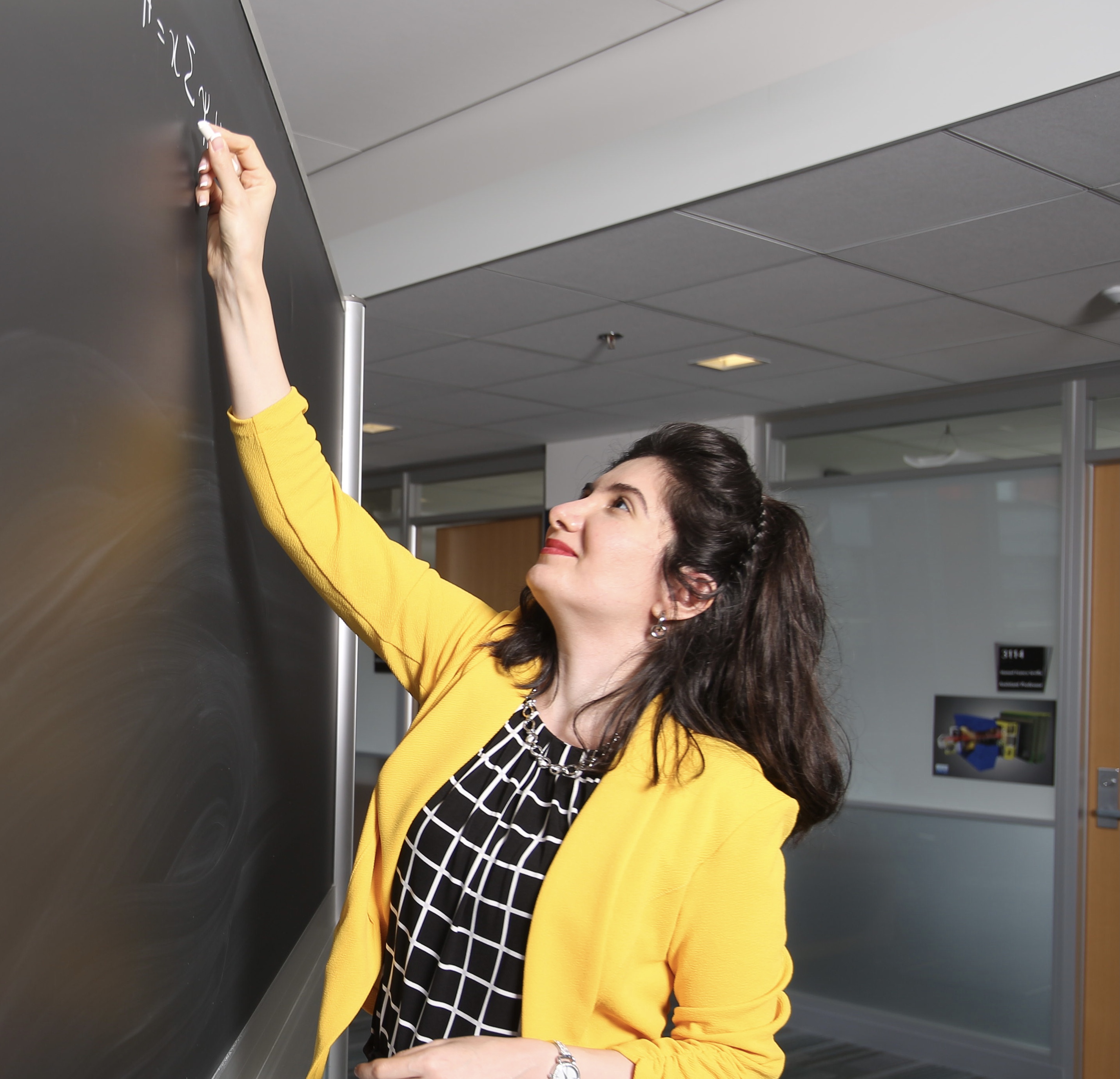Two University of Maryland College of Computer, Mathematical, and Natural Sciences (CMNS) faculty have received the Presidential Early Career Award for Scientists and Engineers (PECASE). Zohreh Davoudi, an associate professor of physics at the University of Maryland and Maryland Center for Fundamental Physics, and Soheil Feizi, an associate professor of computer science with an appointment in the University of Maryland Institute for Advanced Computer Studies (UMIACS), joined the group of 399 scientists and engineers nationwide to be acknowledged by President Biden. The award, which was established in 1996 to recognize young professionals who have demonstrated exceptional potential for leadership in their fields, is the highest honor the U.S. government bestows on early-career scientists and engineers.
Zohreh Davoudi
In addition to her appointment in CMNS, Zohreh Davoudi, is also a Fellow of the Joint Center for Quantum Information and Computer Science and the Associate Director for Education at the NSF Quantum Leap Challenge Institute for Robust Quantum Simulation.
“I am truly honored by this recognition,” Davoudi says. “This award signifies that the President and the U.S. government appreciate the important role scientists and engineers play in advancing society. I am excited to continue exploring the frontiers of nuclear physics and quantum information science using advanced classical- and quantum-computational methods and to continue building a community of amazing junior and senior collaborators who share the same or similar goals.”

Davoudi’s research focuses on strongly interacting quantum systems and investigates how elementary particles, like quarks and gluons, come together and form the matter that makes up our world. Her work to understand the foundations of matter includes developing theoretical frameworks and applying cutting-edge tools, like quantum simulations, to studying problems in nuclear and high-energy physics. Ultimately, she hopes to describe the evolution of matter into steady states that occurred in the early universe and that happens at a smaller scale in the aftermath of high-energy particle collisions, like those in experiments at the Large Hadron Collider.
Davoudi has also been acknowledged by other awards, including a Simons Emmy Noether Faculty Research Fellowship, an Alfred P. Sloan Fellowship, a Department of Energy's Early Career Award and a Kenneth Wilson Award in Lattice Gauge Theory.
“Zohreh is an exceptionally agile physicist and an expert in nuclear theory,” says Steve Rolston, a professor and chair of the Department of Physics at the University of Maryland. “She has embraced the new world of quantum computing and is now a leader in figuring out how to use quantum computation to solve challenging nuclear and high-energy physics problems.”
Soheil Feizi
Soheil Feizi is a renowned expert in the field of reliable and trustworthy AI. His innovative work has appeared in The Washington Post, BBC, MIT Technology Review, Bloomberg, and Wired. He recently founded and is the CEO of RELAI, a company whose mission is to make AI reliability accessible and achievable for everyone.
“I’m truly honored by this recognition and am grateful to my amazing students, colleagues, and mentors who made this possible,” Feizi says. “I look forward to building on this momentum to continue pushing the boundaries of AI and making it more trustworthy and impactful for everyone.”
Feizi, a core faculty member in the University of Maryland Center for Machine Learning, is also a strong advocate for equity and inclusion in science and technology. He was the driving force for establishing the Rising Stars in Machine Learning program, now in its sixth year. The annual event is designed to empower and engage early-stage researchers from underrepresented backgrounds in computer science and machine learning.

He is also active in the Institute for Trustworthy AI in Law & Society (TRAILS), where he collaborates with other TRAILS faculty on projects like investigating text-to-image generative AI models like Stable Diffusion, DALL-E, and Midjourney, focusing on myriad legal, aesthetic and computational aspects that are currently unresolved.
In 2024, Feizi contributed to the House Bipartisan Task Force on Artificial Intelligence's report, which released its findings in December.
The PECASE award is but one of several significant honors that Feizi has received since arriving at the University of Maryland in 2018.
Last year, he was the recipient of the Army Research Office’s Early Career Program Award. The award supported his efforts to develop provable methods that can improve the robustness of dynamic AI systems.
In 2022, Feizi received an Office of Naval Research Young Investigator Award to advance artificial intelligence agents that can robustly interact with humans and perform various tasks with minimal supervision.
And in 2020, he received a National Science Foundation Faculty Early Career Development (CAREER) award for a project intended to study deep generative models.
Feizi earned his doctorate in electrical engineering and computer science from the Massachusetts Institute of Technology (MIT) in 2016.
Original story written by Bailey Bedford and the UMIACS communications group
